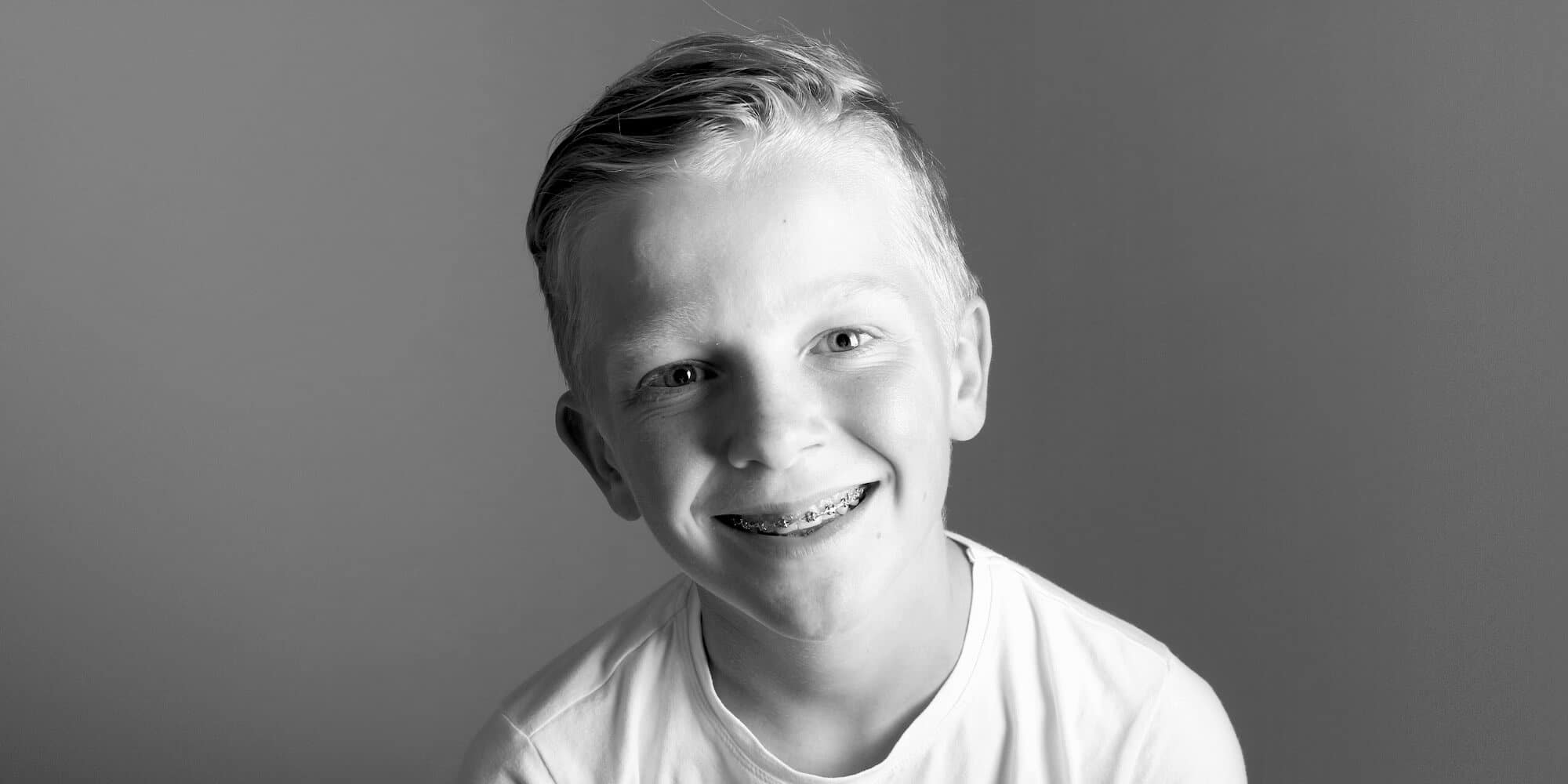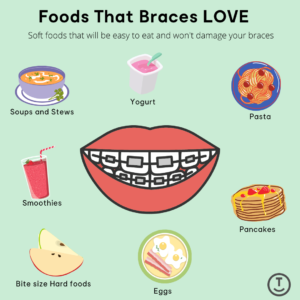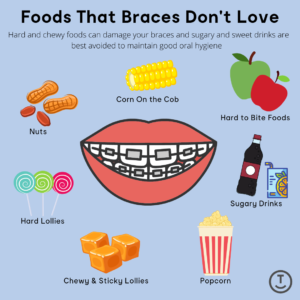Braces
For anyone undertaking braces treatment, but especially a tween or teen, it can be a big transition and often, a big change to become accustomed to.

Braces are a very effective orthodontic treatment for children and adults, used to straighten and reposition misaligned teeth.
They correct malocclusions, including underbites, overbites, open bites, deep bites, cross bites, and crooked teeth. In addition to straightening, braces can improve dental health, because they correct crowding which makes it difficult to brush and clean teeth, and can also work to correct gaps in teeth.
Metal Braces
Metal braces are the most common orthodontic treatments on the market and are extremely effective in helping to straighten teeth and correct bad bites.
The hardware we use includes a series of stainless steel brackets, thin metal wires and bands, which can be as subtle or as brightly coloured as you would like.
While metal braces have been used by orthodontists for over 100 years, they have evolved over time to be smaller and more effective.
The sturdy nature of this fixed orthodontic treatment means that they can perform more complex tooth movements, making them the popular choice among orthodontists.
Ceramic Braces
Ceramic braces are the same as metal braces, with the only exception being that they’re made out of a tooth-coloured porcelain material instead of stainless steel.
When paired with clear brackets, ceramic braces are virtually invisible, making them a more popular choice among adults and some teenagers, who may be concerned about the appearance of metal braces.
In terms of their effectiveness, ceramic braces function in the same way, and can treat the same complex bite issues as metal braces.
Do braces hurt?
This is different for everybody however, when you first have your orthodontic appliance fitted there may be some discomfort as your body adjusts to the gentle pressure on your teeth. In addition, you may experience some rubbing of the appliance against the inner cheek.
Everybody experiences pain differently, but it should be only minor discomfort that will disappear after a couple of days. Painkillers and orthodontic wax may be used to ease any discomfort until you adjust to your new orthodontic device. Our staff are more than happy to assist patients getting used to their new braces!
How long will I have to wear them for?
This will depend on your particular case as everyone is different. It can take anywhere from six months to two years to complete a full course of treatment. This depends on a number of factors including the types of movements that need to be completed and the type of treatment you have selected. We will give you a better idea of your particular timeline when setting up your treatment plan.
What can I eat?
This is a very common question! With braces you’ll need to avoid very hard and crunchy foods that can break the braces off the teeth – such as whole apples, whole carrots or crusty bread. It doesn’t mean you have to avoid those foods altogether – for example, apples can be sliced and chewed carefully on the back teeth. Immediately following an adjustment or orthodontic appointment, it is best to stick to soft foods such as bananas, pasta or soup if your teeth are feeling a little bit tender.


How do I look after my braces?
Great question and one we have answered here.
Can I continue my hobbies as usual?
No matter what type of orthodontic treatment you have, they shouldn’t get in the way of living your life. Teens who play a musical instrument such as a trumpet or flute may find that it takes a little bit of time to adjust to the new mouth placement with your orthodontic device. Sports are still safe to do, but you will need to ensure you wear a mouthguard at all times in contact sports like football.
If you already own a mouthguard, you will need a new mouthguard fitted to best protect your teeth. We make our own custom fitted mouthguards, or call us on 133 862 to book in to have a mouthguard made especially for you.
Do you have real before and after photos of your patients?
We sure do! Here are just some of our transformed smiles using braces. Check out more HERE.
Grace


Bec


Louis


FAQ'S
Everybody experiences braces differently. There may be some discomfort as your mouth adjusts to the new pressure on your teeth. You may also feel your new braces rubbing against your inner cheek. This should all disappear in a few days.If the tenderness continues, try dissolving one teaspoon of salt in lukewarm water. Swish and gargle this solution in your mouth for a few minutes – and remember not to swallow! If this doesn’t help, use painkillers and orthodontic wax to relieve any discomfort until you get used to your new braces. We are always happy to help patients who are experiencing any aches or pains.
How long you require braces treatment really depends on your teeth and your bite. When our patients come in for their first consultation we take X-rays and scans to determine your personalised treatment plan. Your treatment plan will provide advice on how long treatment will take to get the best possible outcome.
Absolutely! We understand the importance of an active lifestyle and your treatment shouldn’t stop you from participating in the sports you love. If you are concerned a particular activity may cause damage to your mouth whilst in treatment, we recommend a mouthguard that can be easily fitted over your braces or aligners. Our team can help with this! We offer a “boil and bite” mouthguard service whilst in treatment that can conform to your ever-changing teeth profile.
It’s very important to maintain good oral hygiene, especially when you are undertaking orthodontic treatment. Braces make it easier for pieces of food and plaque to get trapped in the brackets of your braces. We recommend brushing and flossing for 5 minutes at least twice a day. When brushing your teeth with braces, use a toothbrush with a soft head to reach those tricky areas. Hold your brush at a 45-degree angle, and gently brush your entire gum line. Then turn your toothbrush at a downward angle on the top of your brackets, and then at an upward angle to clean the bottom of your brackets. Flossing is also essential. We know it can be a challenge with braces, but it’s not impossible. If flossing tape is too tricky, use floss threaders or interdental brushes.
How long you require braces treatment really depends on your teeth and your bite. When our patients come in for their first consultation we take X-rays and scans to determine your personalised treatment plan. Your treatment plan will provide advice on how long treatment will take to get the best possible outcome.
We like to see you in the clinic approximately every 6 weeks for a check up to make sure your treatment is progressing well and according to your treatment plan.
We recommend seeing your general dentist every 6 months for a check up. Bring one of our dental check up cards with you at your next dentist visit, ask your dentist to sign the card, bring it with you to your next TOC appointment and we'll reward you with a movie voucher!
Yes, of course! We tailor personalised treatment to meet the needs and individual set of circumstances.
Not necessarily. It really depends on the individual. There are some cases where baby teeth or permanent teeth need to be removed. We pride ourselves on being a non-extraction practice wherever possible. In some more complex cases however it is necessary to consider removal of teeth to ensure the very best outcome is achieved. This is carefully decided on an individual basis and only indicated if no other alternative is available.
We recommend avoiding hard and cruncy foods like apples, carrots or crunchy bread. We recommend completey avoiding the following: chewy foods like licorice or bagels, crunchy snacks such as popcorn and chips, foods that are sticky – chewing gum or lollies, anything hard like nuts or hard lollies and foods that require biting into, such as corn on the cob need to be avoided.The best foods to eat with braces are those that are low in sugar and don't require too much chewing. This includes…
- Bread, mashed potatoes, rice, pasta, pancakes
- Soft and hearty foods like soup and stews
- Cheese, yoghurt and smoothies
- Fruits and vegetables cooked until soft or cut/grated into bite-sized pieces
- Meat, poultry, fish and protein-rich foods cooked until soft or tender
This really depends on the individual patient and what kind of treatment they require.
The most popular alternative to braces is clear aligners like Invisalign or Spark. We are experts in Invisalign and Spark clear aligner treatment. Dr De Angelis was one of the first providers of Invisalign treatment in Australia and one of only three accredited Spark providers in Australia. Invisalign and Spark are popular as they are almost invisible.
Braces and Invisalign both move teeth into their desired position but it really comes down to personal preference. Invisalign and Spark clear aligners are very popular as they are almost invisible and they can be taken out for meals, for events and when playing sports. On the other hand though, braces don't need to be taken off at all so they are great for people who don't think they would be able to wear aligners for 22 hours per day.

























